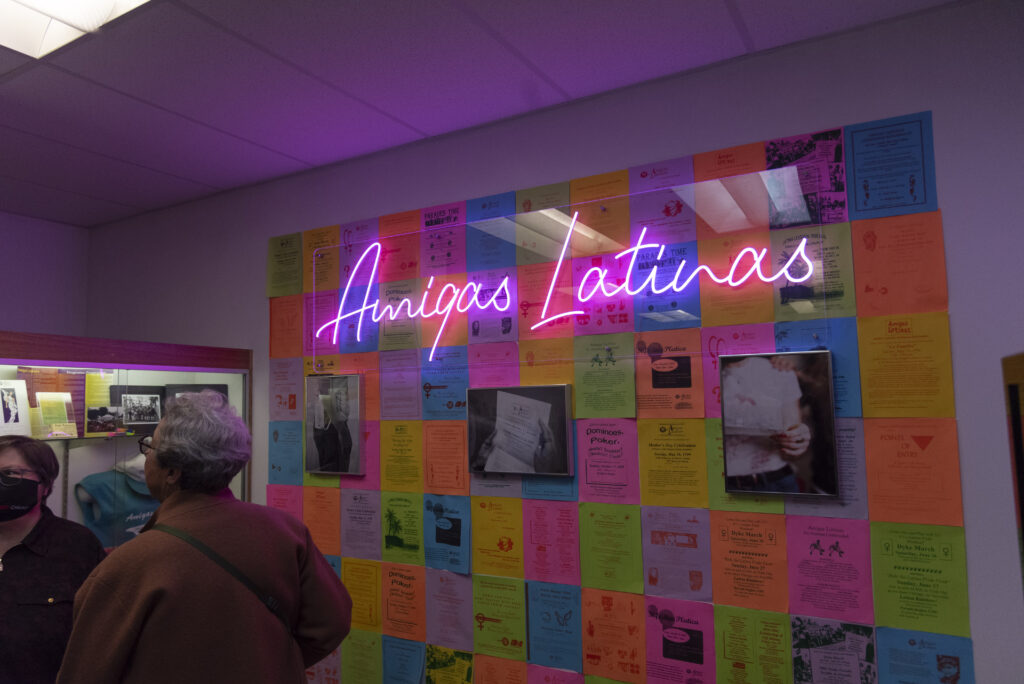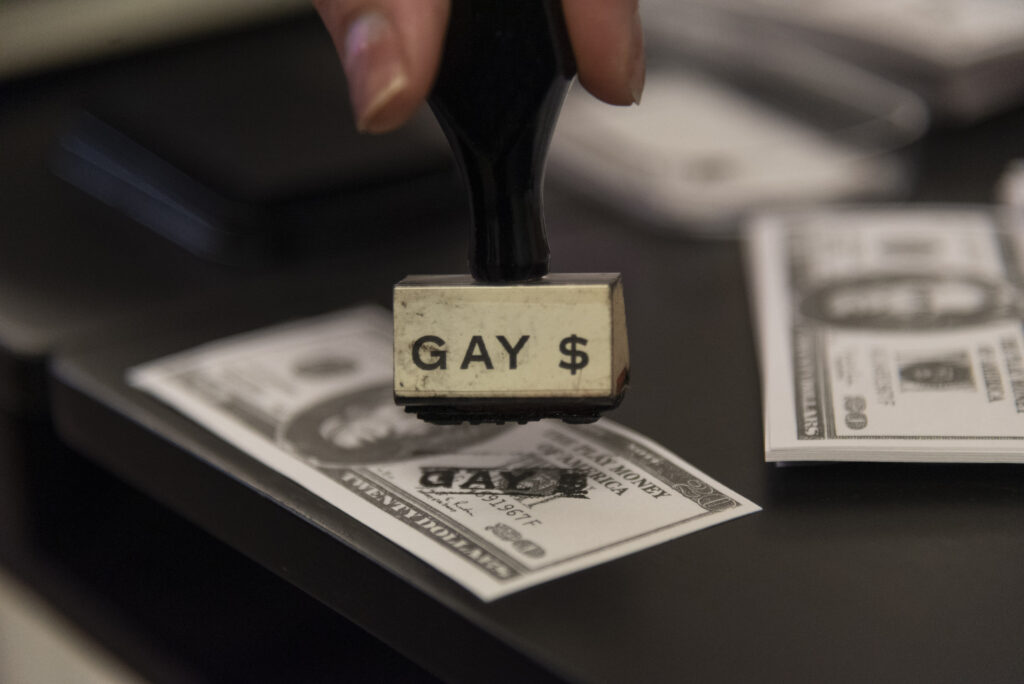The Gerber/Hart Queer Library and Archives is a small — but growing — non-profit organization dedicated to preserving LGBTQ+ stories across the Midwest since 1981.
Preserving Queer Voices: One Night of Art, 42 Years of Activism
There’s another world hiding on the second floor of the Howard Brown Health building, situated at 6500 N. Clark St.
Stacked above a Walgreens, the Gerber/Hart Queer Library and Archives appears a liminal world of stories past, present and future. Only accessible via a tucked-away elevator, the sprawling rainbow decor and wall-to-wall bookshelves create an air of invitation, as if to say welcome everyone who enters.
The Gerber/Hart Queer Library and Archives is a small — but growing — non-profit organization dedicated to preserving LGBTQ+ stories across the Midwest since 1981. Their most recent project, an art exhibit titled “This Archive is Queer: Art from the Archives,” was unveiled Oct. 13 at Gerber/Hart’s fall benefit.
Gerber/Hart’s library and archives includes over 24,000 volumes and 160 collections of relics relating to queer history, including audiovisual media, organizational records, letters, diaries and other personal ephemera belonging to members of the LGBTQ+ community, according to their website.
Illustrating the significance of queer histories while creating a space dedicated to LGBTQ+ visibility, Gerber/Hart partnered with Chicago-based artists who used scanned reproductions of archival materials — specifically promotional posters and magazine erotica — to create the works in the exhibit.

For community outreach and strategic partnerships director Jen Dentel, “This Archive is Queer” displayed Gerber/Hart’s archival materials and mission in a new light.
“Having artists use the collection has been really transformative,” Dentel said. “Having them used in a different way, and having people be able to access this history in a different way is very important.”
Displayed in the exhibit was “Amigas Latinas Forever” — multimedia display of posters, photos and video footage — by Jose Luis Benavides and Amanda Cervantes, which highlights the work of Amigas Latinas, an activist group serving Chicago’s LGBTQ+ community from 1995-2015.
Their archival collection at Gerber/Hart includes 14 feet of photos, flyers and other relics from the organization. Upon viewing, onlookers are met with an overlaid pink neon sign reading, “Amigas Latinas,” which amplifies the colorful works of the group’s archived collection.
“That was something that was important for us, that [Amigas Latinas’ work] could be seen again, and that it can be seen on a level that can be public in this case,” Cervantes said.
In tandem with exploring the Amigas Latinas archives, Luis Benavides and Cervantes said they also used the work to “investigate their personal histories.” Luis Benavides created a film excerpt named “Lulu in the City.” The 10-minute experimental documentary is an excerpt from an ongoing project, featuring audio of his mother discussing her experience as a Latina lesbian over images of Amigas Latinas co-founders Evette Cardona and Mona Noriega.
“It’s so biographical, it’s so personal,” Luis Benavides said. “My story, my mom’s story is tangled up in it — it feels like I’m trying to target Chicago and say, ‘Look.’ It’s like her story runs parallel to the archive.”
Dentel worked alongside operations manager Erin Bell and development manager Michael Rashid to facilitate Gerber/Hart’s everyday operations and plan their fall benefit.
Rashid was the first full-time employee hired by Gerber/Hart in 2021. He said during his job interview he saw the name of a deceased friend on one of the boxes filled with archival materials. The friend, Robert Engler, was a poet and playwright in Chicago but had never been particularly well-known, according to Rashid. For him, the preservation of Engler’s work in the archive demonstrated the power of Gerber/Hart’s mission.
“What I learned was that you don’t have to be very well-known to have your life preserved here at Gerber/Hart if you’re part of the Chicago or Midwest LGBTQ community,” Rashid said. “You don’t have to have your name on a magazine. It can be you, or me, or anybody whose lives could be preserved here.”
Bell said the impact of community involvement has been foundational to the library and archive, which was born out of community donations.Gerber/Hart’s focus on queer communities — past and present — was apparent at their fall benefit, which launched the “This Archive is Queer: Art From the Archives” exhibit.
The other exhibited artwork created from Gerber/Hart’s archival materials is James Hosking’s collage series “The Personals.”
Hosking used Gerber/Hart’s archival collection of gay male erotica from newspapers, magazines and photos to recontextualize marginalized material and “dramatize the era’s push-pull between fear and acceptance, concealment and openness,” according to the project statement.
Hosking was thankful for having access to the archives, describing the exploration process as “spiritual.”
“A lot of what I try to do is find the beauty in things that are ephemeral and would otherwise be forgotten, which I think is the core of Gerber’s mission,” Hosking said.
In addition to the pieces created from Gerber/Hart’s archival materials, “This Archive is Queer” also included a work that was added to the archive during the benefit. The piece is a portrait of Chicagoan lesbian activist Marge Summit and was created by artist Sam Kirk as part of a project with public arts program Queer In(n).

Marge Summit, who died May 17, was a local bar owner and prominent LGBTQ+ activist in Chicago. She is known for initiating the “Gay$” project, which encouraged members of the Queer community to stamp their paper money, demonstrating their economic impact.
Summit was also known for her bar His n Hers, which hosted an open-mic every Sunday night, according to the Chicago LGBT Hall of Fame.
In 1980, Summit produced the album “Gay and Straight Together,” which involved a variety of songwriters and activists who performed at His n Hers. Today the album is considered a “landmark compilation” and is part of the Smithsonian Folkways Recordings Catalog.
“This Archive is Queer” and the fall benefit were simultaneously a celebration of Summit’s life and of the archive’s ability to preserve her memory, according to Rashid.
As a tribute to Summit, Tricia Alexander performed a memoir poem written in her honor. Alexander, who met Summit in 1979 and is featured on her album, recalled the open-mic nights at His n Hers through her words.
“And every Sunday night, we sang together, we laughed together, sometimes we cried together and always, we learned and we accepted more and more about each other,” Alexander said. “Marge opened these doors for all of us.”
These doors metaphorically opened by Summit in 1980 have transformed into Gerber/Hart’s elevator doors — opening into a world of celebration for both the past and the work still being done.
Upon finishing her performance, Alexander looked out into the faces before her — the next generation dedicated to remembering and venerating LGBTQ+ history.
She raised her arms to the sky, calling out to her people.
“Thank you for creating this amazing place,” Alexander said. “Thank you.”
Gerber/Hart Queer Archives and Library accepts donations online via their website. The exhibit “This Archive is Queer” is on display for the public from Oct. 13 to March 31 during Geber/Hart’s operating hours.
The library and archival collections are always free and accessible to anyone who is willing to walk through the elevator doors.

